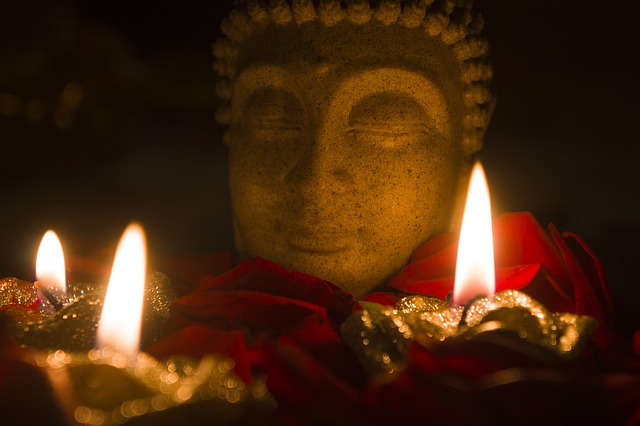4 Ways Buddhism Helps Overcome Some of Life's Most Perplexing Difficulties Backed By Science

Science has confirmed many of the discoveries of the human mind that Buddhism has taught for over 2500 years. The potential solutions available to us through this knowledge are vast as the human mind can seem complex when studied as untrained and conditioned minds most of us end up with by the time we reach adulthood. Drawing on personal experience and my understanding of the Dharma, or the teachings of Buddhism, here is a short list on to illuminate the incredible wisdom that can help us get through any circumstance if we are willing to apply what we have learned.
1) The feeling that something is missing inside us
This particular feeling is a feature of pretty much every human being on planet Earth. This is what drives us to seek relationships and sometimes stay in relationships that aren't good for us. If you look around you can see pretty much everyone is going through it at one time or another. Our minds cause us to perceive that everything is separate including everything inside of us. So, we perceive that we "own" our significant other is "ours" or we want someone to "be mine." The Atlantic published a marvelous interview on this where they reported:

Not so, says Donald D. Hoffman, a professor of cognitive science at the University of California, Irvine. Hoffman has spent the past three decades studying perception, artificial intelligence, evolutionary game theory and the brain, and his conclusion is a dramatic one: The world presented to us by our perceptions is nothing like reality. What's more, he says, we have evolution itself to thank for this magnificent illusion, as it maximizes evolutionary fitness by driving truth to extinction.
And
On the other side are quantum physicists, marveling at the strange fact that quantum systems don't seem to be definite objects localized in space until we come along to observe them. Experiment after experiment has shown-defying common sense-that if we assume that the particles that make up ordinary objects have an objective, observer-independent existence, we get the wrong answers. The central lesson of quantum physics is clear: There are no public objects sitting out there in some preexisting space. As the physicist John Wheeler put it, "Useful as it is under ordinary circumstances to say that the world exists 'out there' independent of us, that view can no longer be upheld."
So, within all this perceiving we constantly feel like everything is separate and the feeling that we are not whole is the illusion of the separate self. Buddhism teaches us that in meditation we will soon see the truth that we are part of one big whole organism that is constantly changing. Once we begin to have this realization we begin to relax and understand that we don't have to go out there and chase what we felt is missing inside of us. If we do the inner work and train our minds through meditation our behavior will naturally just do whatever the most important things are for us to do and the rest begins to fall into place. The best part is that the relationships we do have will be created out of a sense of wholeness not a sense of obligation or neediness. This also eradicates loneliness.

2) Changing bad habits
Humans are habit making creatures. It is this feature that allows us to be efficient and learn skills. This same element of our minds that makes it possible us to be efficient is the same thing that also allows us to develop bad habits. Bad habits usually start out because we are getting some kind of reward then before we know it we can't stop. All is not lost, though, and science has shown that the best way to stop a bad habit is to replace it with a new one. But, the pull back to the old habit is very powerful so the way to counter this force is through habit stacking. And the best habit to stack is meditation.
Habit stacking is basically adding a new habit on top of one you already have like brushing teeth/flossing. I started my meditation practice by stacking after my morning tea. It's automatic now. Adding meditation to our daily routine will allow us to finally have awareness about what we are actually doing. OK, that's great but what about that reward we were getting from our bad habit? That a pretty strong force that pulls us back. Well, mindfulness as a result of meditation makes us curious and curiosity is a natural human inclination that gives us a positive reward!
Psychiatrist Judson Brewer tell us exactly this in this short TED talk. It's super short and super interesting so it satisfies our curiosity and gives us that positive reward we crave so I hope you watch it!
3) Anxiety, Fear, Anger, Dissatisfaction
We all experience anxiety from time to time, some people more than others. I can't remember the last time I experienced anxiety. I was even assaulted by a neighbor in from of my building at my former residence in October 2017 and didn't even have anxiety after that, although I did have a couple nightmares. How is this possible?
Science tells us that anxiety is part of the brain and nervous system's way of signaling to us that we need to be vigilant, sometimes hypervigilant. Although, it appears popular theories say this is the result of the amygdala, a small part of the rear lower part of our brains, it is actually part of a threat detect system that we evolved to help us survive (The Amygdala Is NOT the Brain's Fear Center). The bottom line is we have all had to deal with these two uncomfortable feelings.
Meditation combined with Buddhist teachings help us to see that, first of all, all humans deal with these feelings. The teaching of the hindrances map these out in great detail as obstacles to peace and happiness. They are:
- The belief in a permanent personality, ego (Pali: sakkāya-diṭṭhi)
- Doubt, extreme skepticism (vicikicchā)
- Attachment to rites, rituals, and ceremonies (sīlabbata-parāmāso)
- Attachment to sense desires (kāmacchando)
- Ill-will, anger (vyāpādo or byāpādo)
- Craving for existence in the Form world [heavenly realms] (rūparāgo) (wishing you were a different person)
- Craving for existence in the Formless world [heavenly realms] (arūparāgo) (wishing you were dead)
- Conceit (māna)
- Restlessness (uddhacca)
- Ignorance (avijjā)
~ Wikipedia - 10 Hindrances
These items take us immediately out of what is really going on in any given moment and creating a false version of reality.

You may be familiar with the story of the 2 wolves we have inside us, one is darkness and one is light. The one that wins is the one you feed. Buddhism helps you feed the the one that is light
It is helpful to know that we are not alone and it is helpful to know there is a way out. Thankfully, Buddhist teachings give us other qualities and intentions to focus on our quest to eradicate these hindrances and to evolve our minds to produce thoughts and feelings of peace. The Noble Eightfold Path and the Perfections or the paramitas:
- Dana Paramita: Perfection of Generosity
- Sila Paramita: Perfection of Morality
- Ksanti Paramita: Perfection of Patience
- Virya Paramita: Perfection of Energy (Enthusiasm)
- Dhyana Paramita: Perfection of Meditation
- Prajna Paramta: Perfection of Wisdom
A series I recently shared goes into this in detail Buddhism: Karma and The Family on how to implement each of these positive qualities and behaviors. My argument in the series on dealing with family issues by focusing on the paramitas is we are so busy implementing these in our lives we won't have time to focus on the negative. Additionally, they give us the positive reward our brains are always looking for and that is, scientifically speaking, what makes them work. Along with the mindfulness skill we develop with meditation we can completely remove negative states and almost never have to deal with them again, as fantastic as that may sound. It's true. Having implemented this myself, as a person with severe PTSD I still have symptoms but I don't react to them.
4) Walking Away From Situations That No Longer Serve You

~
Over the long term, people who react more to stress have a higher risk of cardiovascular disease. This risk particularly is linked to people who tend to be excessively competitive, impatient, hostile, and move and talk quickly. Of these characteristics, hostility is often pinpointed as the most significant. PsychCentral
Not sure if you see where I'm going with this final one here today…but, this is to illustrate once more the wisdom of Buddhist practice and study. The process of meditation which cultivates mindfulness so that we become aware of the contents of our minds which as we see here are very close to what the Buddhist call the hindrances I spoke of above. The study of Buddhist teachings shows us exactly how we can have the wisdom to change ourselves and sometimes that change is how we are engaging with a situation that is or has the potential to cause harm to our psychological or physical health.
Buddhism teaches us the methods to build resilience and remove unwanted things from our lives by experimenting with the instructions in the sutras and see if they actually work. I am so gung ho because I actually started on the Buddhist path, not because I was sure of any of it. But the exact opposite, I knew nothing about it and had an experience of the little "I" or "self". That says I, me all the time, well, it disappeared. I was so astonished I had to find out what exactly happened to me, that lead me to Zen then that led me to pay deeper attention to the teachers I already knew but didn't understand.
So, if you follow the Eightfold Noble Path and are practicing meditation naturally you will remove yourself from any situation because you have trained your mind to operate on a higher level and you just won't tolerate it.

Conclusion
I get excited every time I write one of these essays because it commits deeper things I already learned and I also learn new things each time which inform my meditation practice. It thrills me and fills me with the perfection or the paramita of Virya Paramita: Perfection of Energy (Enthusiasm). I hope it inspires you even just a little. I love hearing from you it puts a big smile on my face.
What do you think?

@soulsistashakti is a musical artist and writer based in NYC as well as a practitioner of Buddhist teachings. You can check out my music on my FB artist page at https://www.facebook.com/soulsistashakti
Images pixabay
Recent Posts
Buddhist Meditation: What It Is and How To Start a Practice
Meditation and Buddhism - The Fascinating and Awesome Power of Om Mani Padme Hum
The Magic of Flow and Why Hacks Are Bunk - Part 2
Buddhism: Trauma, Psychedelics and Meditation
Buddhism: What is Karma?
Buddhism: Karma and The Family - Part 1
Buddhism: What is Karma?
Buddhism: Karma and the Family - Part 2
Buddhism: Karma and the Family - Part 3
Zen Mind and the Mind of Bruce Lee
Great post! I needed to hear this today! I’ve never heard the term habit stacking. This helped me figure out how I can work on my bad habits and replace them with better ones! Thanks for the post!!
@brettcalloway I know, right! It seems to me like there is always a solution both the processes in Buddhism and in science help us find them. Thank you for stopping by!
There are so many posts that are just "Fluff". This post of yours was quite the opposite. Thank you very much.
27 years ago I left the LDS/Mormon church that I had given 30 years of devotion to. it was quite a devastating experience since it had been the road map of my life. At the time I swore I'd never place a religion or a person between myself and "God". And I kept that commitment until 14 months ago, when I read Jack Kornfields "The Wise Heart". I discovered that the system of personal faith I had developed for myself over the years was very compatible with Buddhism. So I avidly adopted many of the practices. Buddhism filled out and completed my personal faith.
Actually, I'm going to attend my first Buddhist meditation group this coming Monday in hopes of finding a community of souls I can join with. I must tell you that my personal sense of Wholeness and my experience of Oneness has changed everything. One of my favorite "tools" has been mindfulness. One practice I had already developed was gratitude. So, yes, I am grateful for your post.
I was just thinking this morning of posting some elementary concepts regarding Buddhism and then voila here you are! I will follow you because I look forward to your posts. Many blessings.
Hey @mistermercury it's so nice to chat with you again. What you just shared warms my heart and you are living proof about the power of what I like to call Buddhist discoveries. I wholly urge you to find a meditation community to sit and study with. Here in NYC I align with Buddhist Insights and they do Facebook Live events of many of their retreats and are all free and operate on dana which means generosity. Be well and I am always here to share on your journey!
Good to hear from you. May you have a blessed day.
I think what you have to offer is really good. I want to see Steemit become a place where one can be lifted up. Perhaps, by our concerted effort we can make a difference. RESTEEMED.
Me too! Thanks my friend.
Good post! Thanks for sharing with us.
I enjoyed all of your post! Thank you for share!
It's really very helpful for meditation practice!
I hope you try it out. My post right before this one offers instruction 🌟 Buddhist Meditation: What It Is and How To Start a Practice 🌟
Thank you and I try it!
I have followed you, please follow me! Thanks :)
@soulsistashakti thank you for helping us understand how Buddhism is useful for us in understanding, accepting, and overcoming the same limitations that many of us experience! I appreciate you voting for me as a https://steemit.com/~witnesses and resteeming my post a few months ago about Secrets of Influence!
I just resteemed this now and will make an upvote with my voting bot!
You're such a niceman @jerrybanfield
From today I'll be resteeming all your post to my little audience and I'm voting you right now for witnesses.
I'm just hoping I'll also be rewarded with upvotes (smiles)
Thanks
I am followed you! :)
Thank you for sharing this @asura!
Hey Jerry @jerrybanfield, hows it going, thanks for stopping by again. I really appreciate your open mindedness. Buddhism is my passion, it changed my life and helped me replace a lot of unhealthy ways of coping. Wishing you and your family well!
What you've learned benefits you alot , and buddhism hasn't have any relationship with science.
At the end good post informative.
Science has backed up the findings of Buddhism. If you think Buddhism has no relationship to science tell that to the french monk Mathieu Picard or the Dalai Lama himself who often speaks of science the correlations between the two. Perhaps you are ill informed about what science actually is.
I read and enjoyed all of your article. Watched the video too, about being curious about the things you experience to help break bad habits. Thanks for sharing your knowledge and experience with Buddism!
Hi Kenny! As always nice to hear from you, and I got a lot out of that video because when you understand that curiosity is a reward it motivates you to keep going and become skilled at mindfulness :)
Great ur post for science ,,, good luck my dear @soulsistashakti 👍
Great article,very inspiring.resteemed
Thank you for that.
It is an really amazing post from you..thank you for sharing the informations with us.